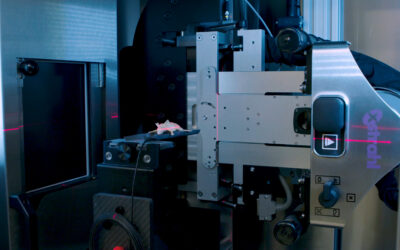Purpose
The precise dosimetric and geometric characteristics of small animal irradiators are essential to achieving reproducible dose delivery, especially in cases where image‐guidance is utilized. Currently, radiochromic film is the established measurement tool used to evaluate beam characteristics for these systems. However, only 2D information can be acquired with film. This study characterized both the dosimetric and geometric properties of the small animal research radiation platform (SARRP, Xstrahl) for commissioning purposes using a 3D radiochromic dosimetry system with a submillimeter resolution optical computed tomography (OCT) scanner.
Methods
Like a modern clinical linear accelerator, the SARRP features both a beam delivery system and a cone beam computed tomography (CBCT) imaging system. Dosimetric and geometric characteristics of the SARRP were studied using EBT3 radiochromic film and 3D PRESAGE dosimeters. Dosimetric measurements included percent depth dose (PDD) curves and beam profiles. For geometric evaluation, the isocenter sizes of the treatment stage and gantry rotations as well as their coincidence were measured using star shot patterns. A commercial Epson Expression 11000XL flatbed scanner was used for readout of irradiated EBT3 films at 300 dpi resolution. Each irradiated PRESAGE dosimeter was scanned using a submillimeter resolution single laser beam OCT scanner. Acquired data were reconstructed with a resolution of 0.3 mm/pixel.
Results
PDD data measured from films and 3D dosimeters agree to within ±3% for depths up to 5 cm, for both 3 × 3 and 10 × 10 mm2 fixed collimation. Profiles were analyzed at 10, 20, and 30 mm depth for 3 × 3 mm2 and 10 × 10 mm2 fields. The FWHM measurements for both dosimeters agreed to within 0.01 mm, and the penumbras agreed to within 0.1 mm for 3 × 3 mm2 and 0.5 mm for 10 × 10 mm2. Gantry and treatment stage isocenter sizes were determined to be 0.21 and 0.43 mm using EBT3 film, and 1.72 and 0.75 mm using PRESAGE dosimeters. Absolute isocenter shifts, evaluated with 3D phantoms, were 0.80 mm for the gantry rotation isocenter (treatment isocenter) with respect to the laser‐defined setup isocenter, and 0.71 mm for the gantry rotation isocenter relative to treatment stage rotation isocenter (CBCT isocenter). The difference between CBCT isocenter and laser‐defined setup isocenter was 0.68 mm.
Conclusions
This study demonstrated that 3D PRESAGE dosimeters can be used for verification of precise targeting for the SARRP. This 3D dosimetry system can be utilized to obtain information on both geometric and dosimetric properties, as well as acquire beam data parameters for the purpose of commissioning image‐guided small animal irradiator systems.
Yong Hum Na, Yi‐Fang Wang, Paul J. Black, Christian Velten, Xin Qian, Shih‐Chi Lin, John Adamovics, Cheng‐Shie Wuu







